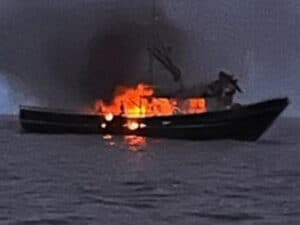
Navy doesn’t buy Rand conclusions on green fuels
Written by Secretary of the Navy Ray Mabus has lost none of his enthusiasm for alternative fuels, despite publication of a Rand Corporation study that sees no military benefits in switching to new fuels.
Secretary of the Navy Ray Mabus has lost none of his enthusiasm for alternative fuels, despite publication of a Rand Corporation study that sees no military benefits in switching to new fuels.
“A clean energy economy supports American workers and creates new jobs,” said Secretary Mabus at a clean energy summit yesterday.
“History has taught us the competition for resources has been one of the fundamental causes of war for centuries,” said the Secretary, noting that the dependence on fossil fuel continued to produce bad results during the time of war by endangering Sailors and Marines charged with guarding convoys bringing energy to bases and machinery. He urged that the solution to this reliance and resulting war and loss of lives is the utilization of alternative fuels.
Secretary Mabus announced five energy targets in October 2009, that the Navy has steadily continued to pursue.
The goals included:
- Energy Efficient Acquisition: Evaluation of energy factors will be mandatory when awarding contracts for systems and buildings.
- Sail the “Great Green Fleet”: DON will demonstrate a Green Strike Group in local operations by 2012 and sail it by 2016.
- Reduce Non-Tactical Petroleum Use: By 2015, DON will reduce petroleum use in the commercial fleet by 50%.
- Increase Alternative Energy Ashore: By 2020, DON will produce at least 50 percent of shore-based energy requirements from alternative sources; 50 percent of DON installations will be net-zero.
- Increase Alternative Energy Use DON-Wide: By 2020, 50 percent of total DON energy consumption will come from alternative sources.
None of that seems to have impressed Rand Corporation analysts. In response to a congressional request, the Pentagon asked the think tank to analyze whether alternative fuels can meet the needs of the U.S. military in a climate-friendly and affordable manner.
The study found that If the U.S. military increases its use of alternative fuels, there will be no direct benefit to the armed forces.
Any benefits from investment in alternative fuels by the U.S. Department of Defense will accrue to the nation as a whole rather than to mission-specific needs of the military, researchers found. The study was based on an examination of alternative jet and naval fuels that can be produced from coal or various renewable resources, including seed oils, waste oils, and algae.
Among its recommendations:
- Minimize resources directed at testing and certification of hydrotreated renewable oils, including oils derived from seed crops (e.g., camelina) and algae. Testing and certifying these fuels in high-performance propulsion systems used by the military is simply not on the critical path for resolving the uncertainties associated with these fuels.
- Considering the absence of military benefits, the Department of Defense and Congress should reconsider whether defense appropriations should continue to support the development of advanced alternative fuel technologies.
- If the Department of Defense is to continue to support alternative fuels, its role and the Department of Energy’s role need to be clarified.
The Navy isn’t buying the Rand analysts’ conclusions.
Tom Hicks, Deputy Assistant Secretary of the Navy (SECNAV) for Energy hosted a roundtable event yesterday to discuss the Rand report and said the Navy had reservations on its accuracy and impartiality.
“The lack of engagement with the leading voice on alternative energy, the secretariat, has caused us to have reservations about this report. We haven’t been consulted or asked to provide input on the secretariat level.” said Hicks. “Unfortunately we think there are some misrepresentations and some factual errors regarding to the Navy’s certification and testing efforts.”
“We have some serious reservations about the report.” said Hicks. “The Navy has really led the way in the Pentagon and in DoD on energy issues. We have been focused on alternative fuels since SECNAV announced his goals back in October 2009 on a range of issues, including 50 percent of fuel in the Navy to be alternative fuel sources by 2020. Based on active engagement with alternative fuel and biofuels industry, we have come up with far different conclusions than are indicated in the RAND report.”
Rand and the Navy are not alone in looking at the options for switching marine transportation from fossil energy fuels to greener alternatives. A European Commission sponsored “expert group on future transport fuels” has just come up with a report that says that waterborne transport could be supplied by biofuels (all vessels), hydrogen (inland waterways and small boats), LPG (short sea shipping), LNG and nuclear (deep sea).
January 26, 2011





Leave a Reply
You must be logged in to post a comment.